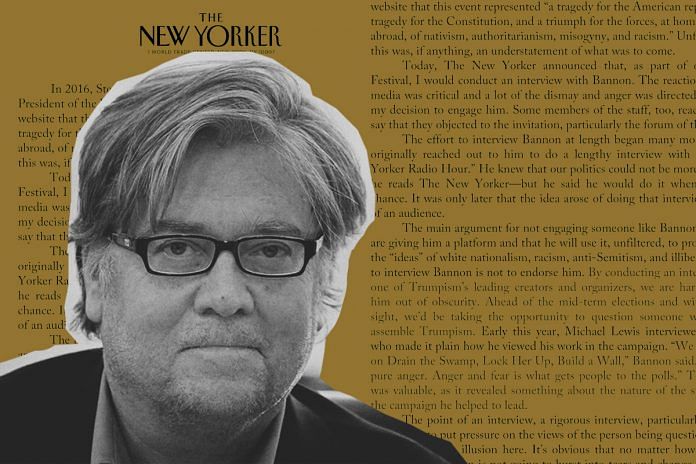After facing severe backlash for inviting Steve Bannon, Donald Trump’s former adviser, to the New Yorker literary festival, the magazine dropped him.
Many argue that by doing so the magazine is only giving the far-Right a stick to beat it with.
ThePrint asks– Steve Bannon-New Yorker episode: Is engaging with those you abhor appeasement or liberalism?
Though disturbing, Bannon’s views should be heard and challenged
 Ashutosh Varshney
Ashutosh Varshney
Professor of Political Science, Brown University
Steve Bannon was first invited to the New Yorker festival and then dropped. What was the New Yorker afraid of?
According to the basic principles of liberalism, one should not only hear dissenting views, but also consciously seek them. Support for the first argument is often drawn from Voltaire’s famous statement: “I disapprove of what you say, but I will defend to the death your right to say it.” And the second argument rests on the belief that if we hear dissenting views, our own claims can perhaps become better and if, by any chance, the dissenting critique convinces us, we can even alter our arguments for the better.
Clearly, this underlying structure of liberalism cannot accommodate incitements to violence. Liberalism can hear all arguments that stop short of promoting, advocating, worshipping violence.
But that is not a threat Steve Bannon poses. It is not easy to argue that his politics calls for a violent overthrow or capture of the American state. He can be accused of promoting prejudice, but not violence. He is not interested in hearing all kinds of arguments, and giving—and this is the third key liberal argument, in addition to the two above – all communities equal standing. For him, only White Americans are true Americans. Only they can restore America from its current tribulations to power and strength. Non-White Americans severely weaken America.
Though deeply disturbing and wrong, this view shouldn’t – and can’t at this moment— be brushed aside. It must be heard and challenged.
The New Yorker has made a mistake.
New Yorker should have followed Economist and stood by its invite to Bannon
 Milan Vaishnav
Milan Vaishnav
Senior Fellow, Carnegie Endowment for International Peace
I am no fan of Steve Bannon, his ideology or his dime-store philosophy. However, the nativist ideas Bannon and his ilk espouse have to be confronted and defeated by better, intellectually superior ideas. If the New Yorker was planning on subjecting Bannon’s views to serious scrutiny and rebuttal—as opposed to giving him an open platform to offer his views unchecked—it could potentially be a productive exchange.
Unfortunately, by withdrawing his invitation, the New Yorker has unwittingly played directly into Bannon’s hands. He can now use the New Yorker’s revocation of his invitation for his far-Right propaganda, bragging to the public that the liberal intelligentsia has no respect for freedom of speech or rigorous, intellectual debate. Frankly, from a public relations perspective, the magazine did not cover itself in glory. Having issued the invitation (which they did of their own accord), the magazine should have followed the path chosen by the Economist, which also invited Bannon to speak at a similar gathering: to stand by its invite, guarantee robust questioning, and refuse to give into the echo chamber.
In other words, the New Yorker should not back down from a fight.
Also read: Rahul Gandhi’s Muslim outreach wants to win over liberals but alienates conservatives
New Yorker’s decision will make free speech hero of a man who attacked and berated minorities
 Rohit Chopra
Rohit Chopra
Founder, India Explained and Associate Professor, Santa Clara University
In a dignified, principled statement of protest, writer and journalist Raghu Karnad withdrew from last year’s Jaipur Literature Festival on grounds that the decision of the festival organisers to invite two members of the Hindu Right-wing organisation RSS to the event was “beyond the pale”.
A somewhat similar situation has presented itself in the US this week when after inviting former White House chief strategist Steven Bannon to headline the prestigious New Yorker festival, the magazine editor of the publication, David Remnick, subsequently uninvited him. The objections to Bannon were the same as those of Karnad to the ideologues of the Hindu Right: the views were beyond conversation and discourse.
In the American context, the objection to Bannon’s presence seems to be based on two grounds. First, he was invited to headline the festival, and that his invitation was based not on intellectual merit but rather on his extremist views. And second, his views, which have been blatantly racist – consider, for example, his statement that Silicon Valley had too many Asian-origin CEOs, who, by implication, could never be authentically American (read White) – had contributed to a climate of physical violence and terror against people of colour, immigrants, and minorities.
Remnick’s initial decision to invite Bannon to headline the New Yorker festival was a classic case of privileged tone-deafness. It is likely that Remnick, as a White male, cannot imaginatively empathise with what Bannon represents to Americans of colour, sexual minorities, and immigrants. It is possible that inviting him as a panellist in a session may not have drawn this degree of protest.
By inviting and then uninviting him, Remnick has only strengthened the hand of the Alt-Right, the newly re-racialised White Right in America, and the conservatives. Remnick’s actions will feed into cheap, if convenient, stereotypes of liberals being enemies of free speech. They will also make a free speech hero of a man who used his radio show and the Breitbart platform as a pulpit to attack and berate minorities, all the while hiding behind the First Amendment of the US Constitution.
Remnick’s corrective measure has thus only made his initial error worse.
New Yorker is complicit in intellectual lynching
 Kanchan Gupta
Kanchan Gupta
Political Analyst
Left-liberal New Yorker has uninvited Right-winger Steve Bannon who, in a manner of speaking, fashioned Donald Trump’s campaign that propelled him to victory. Uninviting inconvenient speakers and writers from events is nothing new. UPenn did it to Narendra Modi.
The intolerable illiberalism of the Left-liberal elite has more than once blocked voices of dissent and resistance. Bannon’s would have been the voice of resistance against the group-think that will dominate the festival. Now that he won’t be there, the festival will resemble an army of frogs croaking among themselves in a well, each croak no different from the other.
David Remnick has done the classical wimp’s hand-wringing act after allowing himself to be bullied into dumping Bannon from the speaker list. Just so that his own credentials are not questioned, he has pointed out that his journal has interviewed Bannon several times and that he looks forward to interviewing him again. How are we to know that the editorial discretion he exercises is not equally tainted by both fear and favour? As Bannon has bluntly put it, “David Remnick showed that he was gutless when confronted by the howling mob.”
The howling mob has been allowed to have its way. All lynchings are not physical. The New Yorker is complicit in what I would term an intellectual lynching or silencing of a voice that would have riled the usual suspects and possibly shown their intellectual bankruptcy. It is this fear of being confronted first hand by a counter-narrative that prompts the shutting out of voices by Left-liberal prigs, what I mockingly call the #LeLi type.
This is not really about free speech. It is the state’s job to protect free speech, not an individual’s or entity’s. Nor is it about Bannon’s rights being abridged. The New Yorker is very much within its rights to decide who gets to speak from its platform. It is essentially about the insufferable pretences of those who claim to be morally superior, preach tolerance of the other and raucously demand that their voices must not be shut out of debate and discourse. Nothing and nobody can beat sanctimonious libbies at not practicing what they preach. This is how it is in the post-truth world where Left-liberal intolerance is a synonym of the hate and prejudice they accuse the Right of.
Appetite for civility exists, let neither liberal elitism nor Right-wing angst say otherwise
 Advaita Kala
Advaita Kala
Founder, Words Count
For far too long, some sections of the liberal establishment have assumed that their platforms are a seal of approval, an acknowledgement which is the equivalent of a knighthood. The world has changed.
Social media, in particular, has jettisoned this change, amplifying and providing platforms to the many who would not make it past the velvet rope of such delicately curated “ideas soirées”. Hence an invite just doesn’t hold the promise or appeal of “gentrification” it presumes to offer.
Then, there is the angst that providing a platform to a view that is inimical to the liberal cause is a case of “laundering” the “reprehensible” person’s ideas. Yet again, a reality check – “liberal” media’s vociferous and targeted attacks on certain politicians has only increased their popularity. There are just too many sources for news and opinion today and big business-run media doesn’t quite come out shining when it comes to credibility.
So, what is the best option? Avoiding contrarian views and rescinding invitations doesn’t make them go away, on the contrary, these ideas are resuscitated and feed off the perceived discrimination. The only way forward is engagement, a civil platform to challenge ideas that differ from one’s own. The Bharatiya tradition of samvaad does just that and it is possible. Last year, I curated a festival of words called Words Count that welcomed speakers from across the ideological spectrum – not one was heckled. The appetite for civility and straightforward exchange exists, let not liberal (paranoid) elitism or Right-wing angst say otherwise.
Indian ‘liberal’ media can learn something from this incident than provide platforms for hate
 Fatima Khan
Fatima Khan
Journalist
Steve Bannon is a dangerous man. Not only was he one of the primary reasons behind a bigoted leader becoming the President of the US, he is now planning on spreading “the movement” in Europe by “sparking a populist Right-wing revolt across the continent”. To suggest that giving such a man a platform is to engage with the other is not only naïve but also logically fallacious.
The last time he was given a platform through the Right-wing website Breitbart, he was more than successful in pushing his nationalist agenda. It’s “engagements” like these that end up normalising bigotry. The man isn’t even in office anymore, and is struggling to keep a public identity that goes beyond “White nationalist guy”. Why help a hateful man with an audience?
When the Economist says they will stick by their decision to further liberal values of engagement, it would do them well to revisit the ideas of liberalism. Engaging with bigotry on such a platform isn’t liberal. There shouldn’t be any tip-toeing around issues of White nationalism—racism doesn’t need any more exposure. Giving the man a pulpit would further legitimise his views.
Indian “liberal” media could learn a thing or two from this incident. One, hate speech, xenophobia, and Islamophobia don’t need you to ‘hear them out’. These are ideas so well-entrenched in so many households across the country that bringing them to TV/website will only do further damage. Two, there are no ‘two sides to the story’ here. Giving bigots your platform means at some level, you are okay with the spreading of bigotry. Three, liberalism is a grossly overused but not nearly half as properly understood term. It’s used by individuals across the spectrum to justify anything and everything. Think of it like this, if Hitler was alive today, would you be willing to give him a platform?
Compiled by Fatima Khan, journalist at ThePrint. You can follow her on twitter @khanthefatima.



